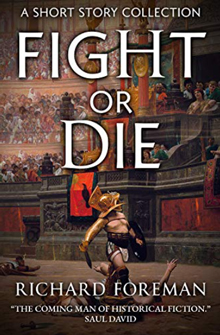Writing a novel can sometimes feel like wading through glutinous mud. But writing a short story can be similar to skating across ice. Before you realise that you’re on a journey, you reach your destination.
The latest lockdown has been far from jolly, to say the least. But I must confess that I had a good time (as good a time as one can have sober, whilst reading) when putting together a collection of short stories, entitled Fight or Die.
The stories serve as a taster menu for some of my historical series. The stories fall under the theme of characters battling against the odds – whether they are soldiers, spies or Hollywood screenwriters – which I thought might be apt in the period of the pandemic. Most of all, however, I just hope that the stories are as fun to read as they were to write. The pieces cover the periods of Caesar’s Rome, the First Crusade, Victorian London and more.
As well as providing some popcorn entertainment for the reader, writing short stories can be of benefit to the writer too. Short stories prompt authors to focus the mind and not waste paragraphs, or lines, in driving their narratives forward. It’s a valuable exercise, which writers should be mindful of when putting their novels together too.
I was asked, when commissioned to write this piece, to recommend a few practitioners of the short story. Whether you are an author or reader, I would heartily recommend that you read the short works of Chekhov and F. Scott Fitzgerald. The stories are filled with wit, insight and humanity. I would challenge anyone not to enjoy Conan Doyle’s Sherlock Holmes short mysteries too.
I would also urge you to read the stories featured in Aspects of History, both in the magazine and on the website. I know that the Editor is looking for more contributors – and the stories can serve as a guide and inspiration for authors to submit their own pieces. You may have something in the drawer or wish to profile your series by writing an appetiser piece, to encourage readers to consume the main course of a novel. Please submit any stories to history@aspectsofhistory.com I would argue that the best historical short stories educate a little, as well as entertain. Like all good books, they should prompt the reader to want to read another book – whether it’s a novel, another short story or work of non-fiction.
In an attempt to entertain and educate a little – and encourage you to submit your own work – I will leave you with the following quote, from Neil Gaiman:
“The short story is still like the novel’s wayward younger brother, we know that it’s not respectable – but I think that can also add to the glory of it.”
Richard Foreman is the author of the short story collection, Fight or Die.




